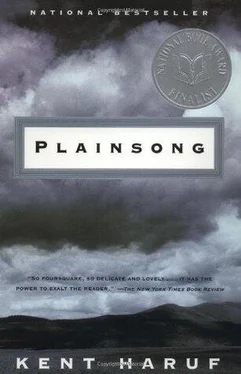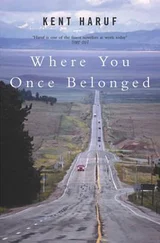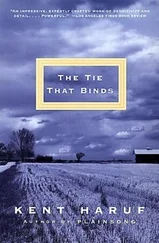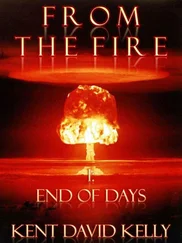Then a different nurse came in and she was angry and said they were not even supposed to be in there, didn’t they know that, not in the maternity room when the baby was in the room, because they were not the husband, were they, they were not the father, and she told them they would have to leave at once, and besides the girl needed to sleep, couldn’t they see she was exhausted, and then she complained bitterly about the baby needing to stay clean and sterile and she took the baby away. But neither the McPheron brothers nor the girl objected to the nurse, because things were all right now; the girl had had the baby satisfactorily after all, and the baby she had delivered was a healthy little clear-eyed girl with her mother’s own black hair, and that was everything anybody in the town of Holt or anywhere else in the world had any right to hope for, and so it was all right.
The next morning, an hour after sunrise, the man at the Holt County frozen food locker on Main Street called Dr. Martin at his home about the half-steer. He wanted to know what the doctor wanted him to do with it.
With what? the old doctor said.
This meat here.
What meat?
McPherons’. They showed up about an hour ago this morning and made me open before I was anywhere near ready, before I even had my morning coffee. With two whole butchered-out hindquarters of prime young black baldy steer. What do you want me to do with it, is what I’m calling about. They said it was yours.
Mine?
They said you’d know why.
The hell they did.
That’s what they said.
All right, the old doctor said. I suppose I do then. I expect I might even have earned it too. Then his voice rose in pitch. Well, hold on to it, for christsake. Don’t give it away. I’ll be down there just as soon as I can get dressed.
Eight days school had been let out. But the town swimming pool was not yet opened in the park. The summer baseball program had not yet taken up. The fair and carnival rides would not be starting until the first week of August.
In the mornings the two boys delivered the paper and came home and did the chores at the barn, fed Easter and the dog and the cats, then went up to the house to breakfast. Three afternoons a week Guthrie was teaching a summer class for the community college in Phillips. And their mother was still living in Denver. They were to understand that their mother was going to stay living there in Denver from now on. Often in the mornings they rode out along the tracks on Easter and took their lunch and once rode as far as the little cemetery halfway to Norka where there was a stand of cottonwood trees with their leaves washing and turning in the wind, and they ate a lunch there in the freckled shade of the trees and came back in the late afternoon with the sun sliding down behind them, making a single shadow of them and the horse together, the shadow out in front like a thin dark antic precursor of what they were about to become. School had been let out eight days already, and they were alone much of the time.
. . .
On an afternoon when Guthrie was in Phillips, teaching, they walked out on the railroad tracks on the creosoted cross ties between the rails going west and walked out past the old man’s house and then on past the abandoned house at the end of Railroad Street and it was hot and dry. Walking a mile and more farther west on the black ties between the shining twin rails along the red ballast. Then they stopped at a railroad cutout gouged through a low sandhill, and they got out the coins and the glue bottle from their pockets.
So the four bright coins lay stuck now on the hot rail, glued and waiting, the four denominations in a row, penny, nickel, dime, and quarter, while the high afternoon sun glinted on them, copper and silver alike, and shone on her bracelet too from the chest of drawers where they had taken it from the guest room where she had left it months ago, the one they had tried on their own wrists that once, before they had climbed up to the apartment and discovered Mrs. Iva Stearns already dead five hours in her chair. At first they hadn’t seen how to rest the bracelet on the rail with the four coins since it would not lie down flat, since on its side it would most likely flip off when the first big driving wheel of the engine hit it, to go spinning off in the air like some piece of glittering ice or glass to land in the cheetweed and redroot where they’d have to look for it and maybe not even find it again, because they had lost pennies and quarters that way before, before they had learned to use the single little drop of glue. Then they hit on the expedient of fitting it over the rail as though it were fitting over an arm and tried it, and it worked satisfactorily like that. So it was hooked over the rail below the coins now, waiting too. And the train would be coming soon.
They waited. They were squatted back fifteen feet from the raised railbed in the cutout, their backs against the high embankment, shaded by the sheered red dirt. No one out on the high plain could have seen them, had anybody been looking at this hour late in May in the middle of the afternoon. Ike got out two of Guthrie’s cigarettes from his shirt pocket and handed Bobby one. He took out a box of matches from his pocket and struck one and lit their cigarettes, first his then his brother’s, and poked the burning match head into the dirt. It made a little white puff when the flame was extinguished. They smoked and waited. After a little while they spat, one after the other, between their feet on the dirt. There wasn’t any train coming yet. They smoked and held the cigarettes out in front to see and then drew on them and blew smoke and looked at each other, and smoked again. It wasn’t coming yet. Ike spat in a looping arc toward the rail. Bobby spat likewise, railward. They smoked the cigarettes down and put them out. Then Ike stood up and looked up the track. He couldn’t see it yet, not its light nor its black shimmering bulk, and he stepped up to the trackbed and lay along the track holding his ear to the rail. After a while his eyes changed. It’s coming, he said. Here it comes.
You can’t tell from that, Bobby said.
It’s coming, Ike said. His head was next to the rail. I hear it.
Bobby got up and listened too. Okay, he said. So once more they crouched together against the dirt embankment within its shade, waiting for the train. There was a grasshopper on the weeds, watching them, chewing its mouth. Ike threw a piece of dirt at it and it hopped onto the track. The train came on from a distance, whistling sudden and long at a mile crossing. They waited. The coins and her bracelet were out on the track. After a time they could see the train, dark-looming in the haze. It came on and got louder, bigger, and appeared as terrific as if it were dreamed, shaking the ground, the grasshopper still watching the two boys, and then the train was on them. They looked at the man standing high above inside the roaring locomotive and dirt was flying everywhere in the air in a white gale so sudden and violent that they had to protect their eyes, then its long string of freight cars was rushing past, clattering and squealing, whistling, a loose rattling clacking noise, the joint in the iron rail before them dipping as the wheels passed, carrying the weight, and then it was gone and the man in the caboose looked back at them and they stared back, not waving. When the train was far down the tracks they rose and picked up the coins and her bracelet.
In the shade of the cutbank they squatted and inspected what they had now. The coins were misshapen oval disks, the profiled heads of the presidents like ghostly shadows, bright, shiny, out-of-round. The faces in outline only, no depth or texture, no dimension. Her bracelet was flattened the same, thin as paper, they could break it. They turned the coins over in their hands and regarded the bracelet, and after a while they poked a hole in the dirt and buried the four coins together with their mother’s bracelet in the dirt under the sheered bank and put a rock over the place.
Читать дальше







